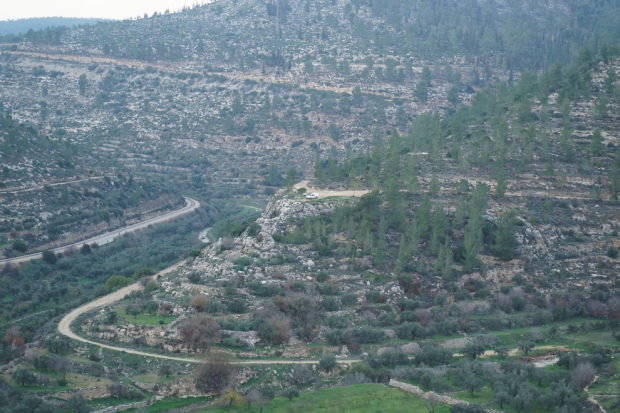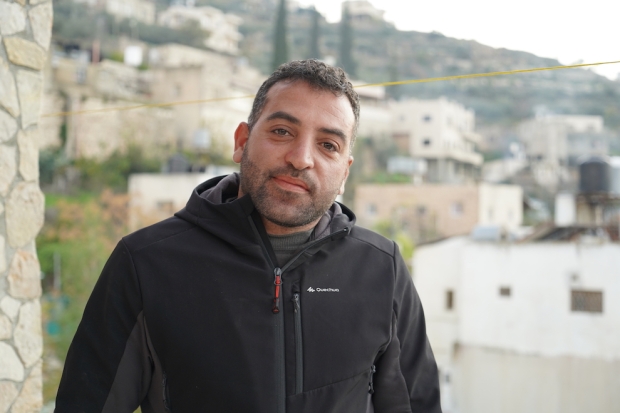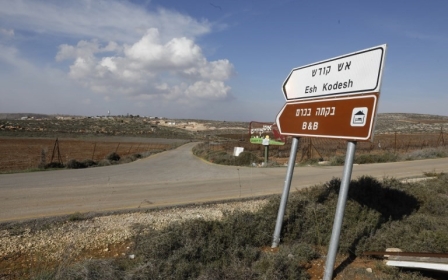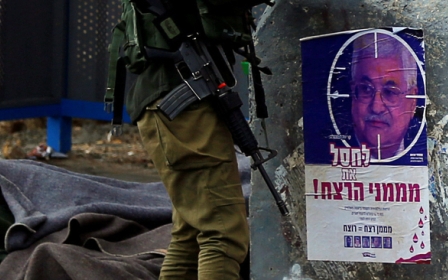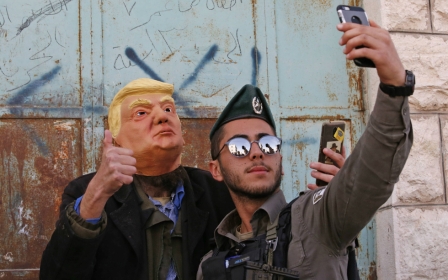After fighting Israel's wall, Palestinian village's ancient hills now face settlers
It was just after midnight on Christmas Eve when 32-year-old Hassan Muamer received a phone call he had been dreading, one that forced him to rush to the famed green hilltops of Battir in the darkness.
“Some of my friends called saying that there were Israeli settlers setting up camp on the mountaintop,” Muamer, from the village of Battir in the occupied West Bank, told Middle East Eye.
What they found when they arrived, Muamer said, was “like a nightmare”. A group of around 100 armed settlers were there, pointing their guns at Muamer and 30 of his friends and neighbours.
“We knew that if we didn’t stop it right away, we would lose that land forever.”
- Hassan Muamer
“Any time we tried to approach them they would cock their guns and tell us if we got any closer, they would shoot us.”
The group of Israeli settlers, allegedly from settlements in the Ramallah area of the West Bank, north of Jerusalem, were laying the foundation for a caravan.
Muamer and his friends knew that what they were witnessing was the creation of a new illegal outpost; the often crude encampments that later lead to larger settlements.
“We have seen this happen in all the villages around us and all across Palestine,” he said.
“We knew that if we didn’t stop it right away, we would lose that land forever.”
A UNESCO World Heritage Site in danger
That land, nestled in the lush hilltops between Jerusalem and Bethlehem and home to some 5,000 Palestinians, has special importance. The ancient terraces carved from the hills as homes for Battir’s thousands of olive trees are protected by UNESCO.
The Green Line, the 1948 armistice line separating Israel and the occupied Palestinian territories, runs through a valley in the centre of Battir - the residential area of the village within the West Bank and the majority of the agricultural land on the Israeli side.
The village is located in the centre of a corridor of Israeli settlements that run from lands south of Bethlehem up to occupied East Jerusalem.
Like its neighbouring villages of Wadi Fukin, al-Walaja and Hussan, Battir’s strategic location has made it the target of Israeli settlers and the authorities for years.
Under the Oslo Accords, more than 75 percent of the village was designated as Area C, which is under full Israeli security and civilian control. In the early 2000’s, Israel issued several military orders aimed at seizing Battir's lands for various Israeli purposes, including the construction of the separation wall.
“For years we have struggled to keep the occupation out of our village,” Muamer told MEE.
“Battir is a beautiful village, rich with culture and ancient history,” he said, pointing to the ancient stone terraces that roll down the hills of the village. “If we let the wall or the settlers come here, it would all be destroyed.”
In 2014, after years of grassroots and political efforts, Battir was recognized as a UNESCO World Heritage Site in Danger for its unique Roman-era terrace irrigation system.
“The people in the community worked tirelessly to get that recognition from UNESCO because we hoped that it would help save our village from having the same fate as our neighbours,” Muamer said.
One year after the UNESCO decision, Israel’s High Court ruled to freeze state plans to build a part of Israel’s separation wall through the centre of Battir - a huge win for the locals.
“We are the only village in the West Bank that has successfully stopped the wall from being built on our land,” he said with a sense of pride. “It gave the people hope.”
A Christmas Eve nightmare
That hope that has kept Battir alive for the past few years suffered a serious blow during that Monday night, as the settlers pointed their guns at the villagers.
As the hours passed further into the night, Muamer and his fellow villagers scrambled to stop the settlers in their tracks.
“We couldn’t approach them or else they would shoot us,” Muamer said. “So we fanned out and surrounded them to make our presence known and show them that there are people that are determined to stop them.”
One of the men called the Israeli police to report the incident. Israeli officials told the villagers to wait for them to arrive, and in the meantime “do nothing”.
When they did arrive, Muamer and his group were shocked to see that with the police and army vehicles were several lorries carrying heavy construction equipment and building materials.
“We thought they were coming to stop the settlers, but instead they took over the positions of the armed settlers and pointed their guns at us while the settlers got to work,” Muamer said.
It was no more than two hours after the arrival of the Israeli forces that the settlers had finished building an entire caravan.
“We were in disbelief,” Muamer said. “We were watching our worst nightmare unfold before our eyes and there was nothing we could do about it.”
Once the caravan was completed and frustration amongst the group mounted, the Israeli army captain in the area approached Muamer and the group, telling them: “Don’t worry, we will make the settlers leave this area, just as long as you do not start throwing stones.”
“But we didn’t believe the captain and refused to take him at his word,” Muamer said. “We knew we had to take action."
So as the clock struck 8am, Muamer and his fellow activists began making phone calls to every Israeli and Palestinian official, lawyer, rights group, journalist and activist they knew.
After nearly 15 hours of waiting, coordinating with officials and arguing with Israeli armed forces, the settlers began dismantling the structure. By 3:30pm, the settlers and Israeli forces had left the area.
All that remained was the steel foundation of the caravan that the settlers had welded the night before.
‘The fight isn’t over’
As Muamer spoke with MEE, rubbing his tired eyes, one of his friends entered the room telling him that the group was heading back to the mountaintop.
“We are not letting our guard down,” he said. Muamer remembered that one of the settlers, as they were leaving the area, shouted: “We will be back!”
And Muamer and his activists are taking the settlers at their word.
“We know how valuable this land is to them, because right now Battir is the only village in the area that doesn’t have a settlement or part of the wall on its land,” he said.
“All they need to create a huge contiguous settlement bloc in the area is to establish a settlement on the lands of Battir,” he continued.
With the stakes higher than ever, Muamer says the villagers are planning on creating watch groups who monitor the outskirts of the villages in shifts – night and day.
“We have to become even more vigilant now,” he said, “this kind of colonization system does not respect or value anything, not a UNESCO site, nothing.”
“Getting the settlers to leave bought us more time, but this fight is not over.”
This article is available in French on Middle East Eye French edition.
New MEE newsletter: Jerusalem Dispatch
Sign up to get the latest insights and analysis on Israel-Palestine, alongside Turkey Unpacked and other MEE newsletters
Middle East Eye delivers independent and unrivalled coverage and analysis of the Middle East, North Africa and beyond. To learn more about republishing this content and the associated fees, please fill out this form. More about MEE can be found here.


